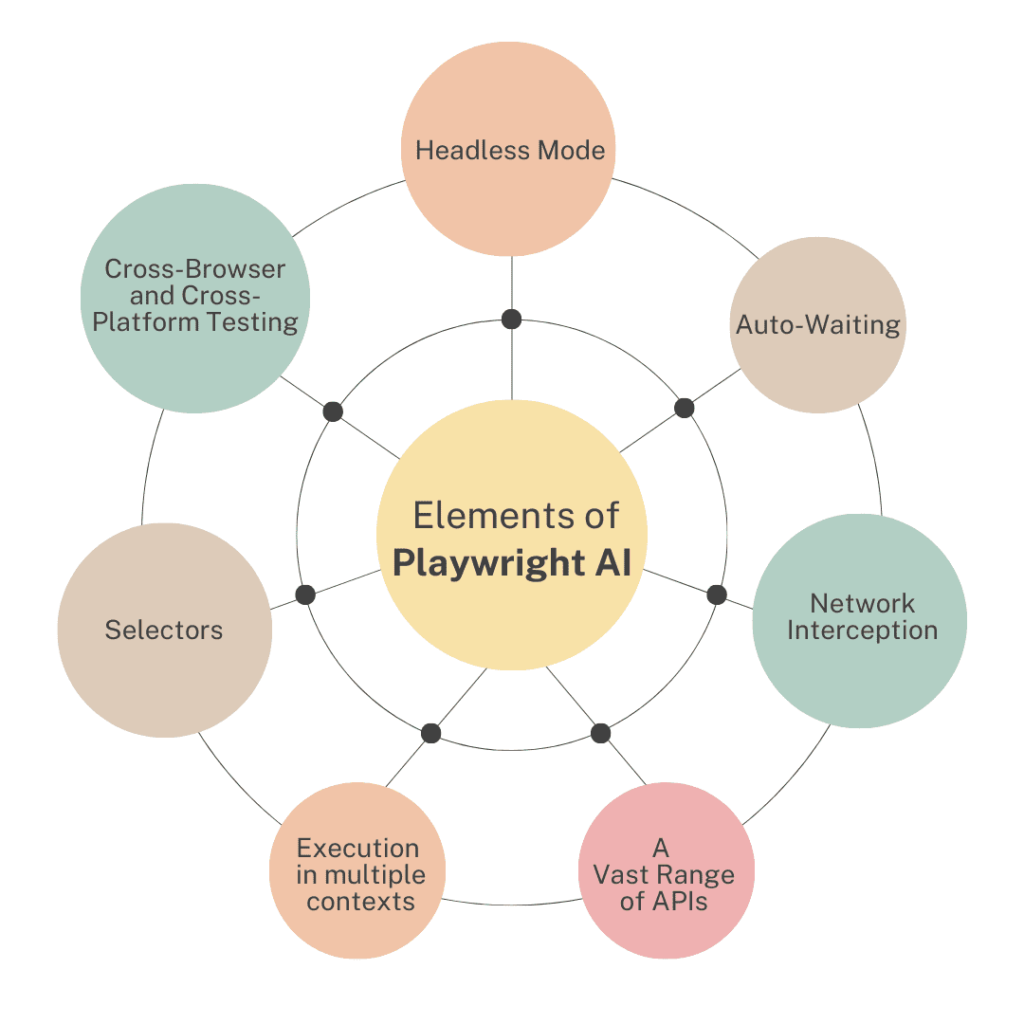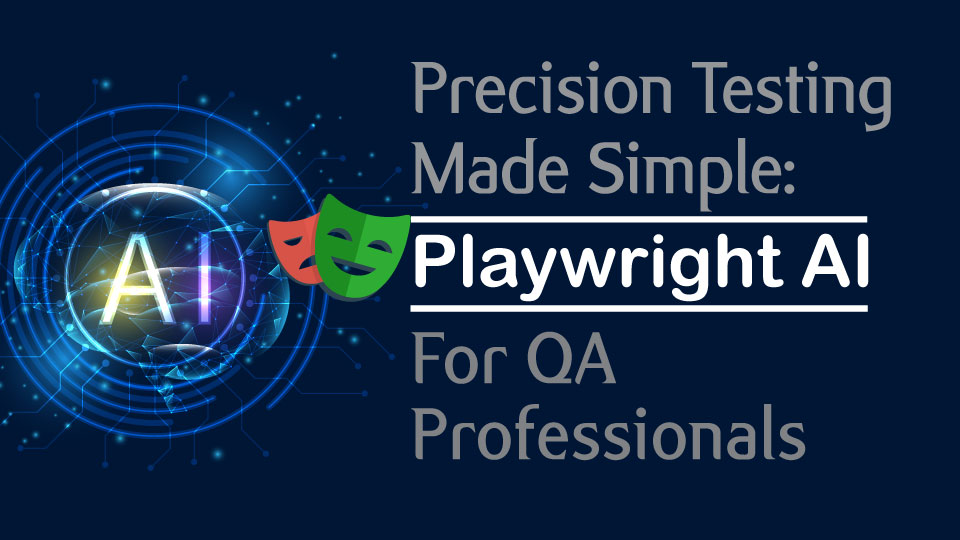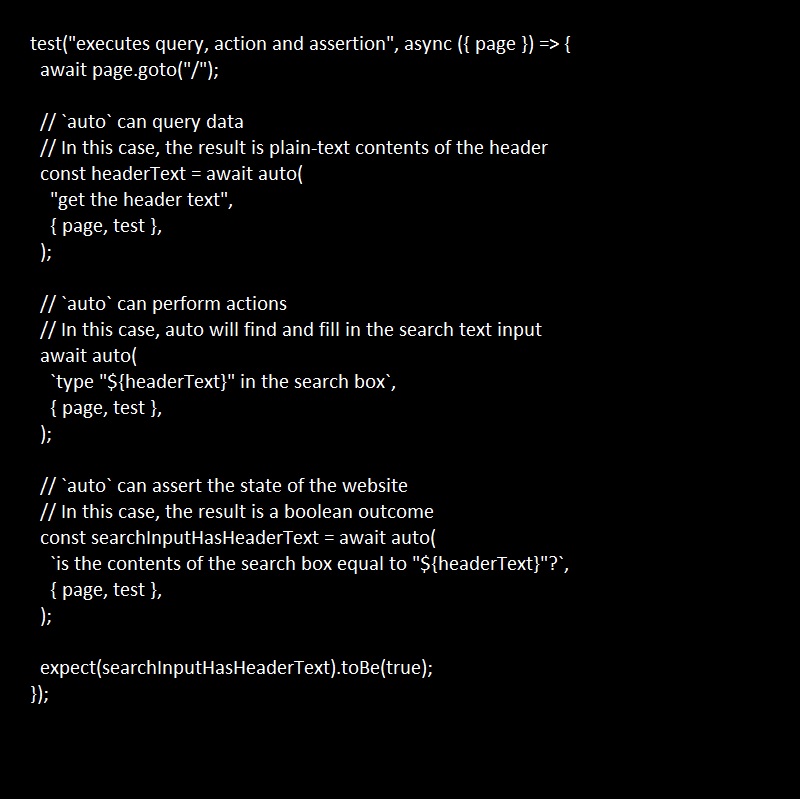Quality assurance (QA) specialists are the lesser-known heroes of software development. Their main job is to ensure that web applications run smoothly in all circumstances. Playwright AI has lowered the expense and enhanced the effectiveness of precision testing. This blog post is a testament to the fact that Playwright AI is transforming and improving precision in the QA process.
What is Playwright AI?
Playwright AI is a cutting-edge automation tool that has made testing web applications across several platforms and browsers easier. This node package offers a high-level API to manage WebKit, Firefox, and headless Chrome from a single interface. This technology enables QA specialists to develop dependable end-to-end tests that don’t collapse. Playwright AI ensures tests are fast, reliable, and capable of running in parallel, which is essential for Agile and DevOps environments where quick iteration is key.
The impact of Playwright AI on transforming QA processes cannot be understated. It concentrates on reliable and efficient testing. Now QA teams can focus on more difficult tasks like exploratory testing and user experience. . With features like auto-waiting, network interception, and cross-browser support, Playwright AI reduces the time spent on writing and maintaining test scripts. It has definitely boosted productivity and significantly improved the quality of the software being developed. Because of this, Playwright AI is fast turning into a vital instrument in the contemporary QA toolbox.
Why Playwright AI for QA?
QA specialists encounter many challenges during web application testing. Modern applications are complex due to their responsive designs and intricate interactions. The need for a strong testing framework is felt to manage a wide range of scenarios. Furthermore, the complexity is increased by the requirement to test across many browsers and devices. Sometimes, it leads to laborious and prone-to-error test scripts. The pace of agile development cycles further pressures QA teams to deliver quick, yet thorough, testing results, making traditional testing methods seem inadequate.
The game-changer for QA professionals is here: Playwright AI. Its cutting-edge features take these difficulties head-on. With Playwright AI, writing cross-browser tests takes much less time because it provides a single API that can execute tests on all major browsers. Its auto-wait feature automatically waits for UI elements to be ready before executing actions, which eliminates a common source of flakiness in tests. Furthermore, QA specialists can simulate different backend states thanks to Playwright AI. Playwright AI’s capacity to intercept and mimic network requests offers a more thorough testing environment that is fast and reliable.
Playwright AI has unique characteristics. These features prove to be a great support for QA teams. It simplifies the testing procedure and provides accuracy and speed, which enables QA specialists to concentrate on developing more complex and significant test cases. This completely aligns with the objectives of agile methodologies through the development of apps of greater quality and a more efficient development workflow. With Playwright AI, QA teams can rise to the challenges of modern web application testing and ensure that they deliver exceptional products with confidence.
Essential Elements of Playwright AI
Playwright AI is a contemporary automation library. It enhances the testing process for quality assurance specialists. These are some of its main characteristics:

Cross-Browser and Cross-Platform Testing
Playwright AI supports testing across all modern browsers, including Chrome, Firefox, Safari, and Edge, on Windows, Linux, and macOS. This functionality guarantees smooth application operation across various user configurations.
Headless Mode
It allows for headless testing, which is faster and consumes fewer resources, making it ideal for continuous integration systems.
Auto-Waiting
Playwright automatically waits for elements to be ready before executing actions, reducing flakiness and eliminating the need for manual sleep or wait calls in tests.
Network Interception
QA professionals can intercept network requests to mock API responses, test error conditions, and analyze how applications behave with various network conditions.
A Vast Range of APIs
Playwright offers an extensive collection of APIs to handle every facet of browser automation, including file uploads, downloads, input, navigation, and more.
Execution in multiple contexts
Tests can run in incognito browser contexts or multi-page scenarios, allowing for parallel test execution and more efficient test isolation.
Selectors
Playwright supports precise element targeting by supporting a wide range of selectors, including text, CSS, and XPath.
Debugging Tools
With built-in debugging tools like tracing and screenshot capture, Playwright AI aids in quickly identifying issues in tests. These features of Playwright AI enable QA specialists to construct accurate and dependable automated tests for web apps.
Playwright AI in Agile Environments
Playwright AI is particularly well-suited for agile environments, where the ability to adapt and respond quickly to change is paramount. Agile teams are all about continuous delivery and quick iteration, and Playwright AI’s features cater to these demands admirably. Teams can test their web applications in user-emulating situations with confidence because it works with a wide variety of browsers and devices. Additionally, the network interception capabilities and auto-wait feature guarantee that tests are not only quick but also less erratic, which is essential for the rapid code changes that are a feature of agile workflows.
In an Agile setting, Playwright AI facilitates a shift-left approach to testing, where QA is integrated earlier in the development process. This shortens the time to market and makes it more cost-effective to identify and fix problems early. The tool’s ability to run tests in parallel and in headless mode also means that feedback loops are significantly shortened. Developers can iterate more swiftly and confidently because they can see the effects of their changes right away. As a result, Playwright AI becomes an enabler of the agile principle of delivering working software frequently.
Furthermore, tests may be created that are reliable, maintainable, and adaptable to the application they are meant to validate, thanks to Playwright AI’s extensive API and selector support. This adaptability is essential in agile environments where requirements and solutions evolve through collaborative effort. Agile teams may guarantee that their testing procedures are as flexible and responsive as the development methodologies they support by utilizing Playwright AI. This will result in software that is of greater quality and development cycles that are more efficient.
Streamlining Your Testing Workflow with Auto Playwright AI
With Auto Playwright, we are able to execute Playwright tests in an entirely distinct manner. It is really easy to get going:
1. Installation: You can use npm to configure the auto-playwright dependency
npm install auto-playwright –D
2. Configuration: To take advantage of the AI features, configure your OpenAI API key:
export OPENAI_API_KEY=’your_key_here’
3. Usage: Integrate auto function in your tests easily:
import { test, expect } from “@playwright/test”;
import { auto } from “auto-playwright”;
End-to-end test example:
Improving Test Coverage of Playwright AI
Maintaining software quality requires increasing test coverage, especially in contexts with frequent and rapid changes that are agile in nature. This objective is greatly aided by Playwright AI, which offers a strong framework for automating end-to-end testing. Because it can simulate user interactions across several browsers and devices, quality assurance teams can cover a broad spectrum of user scenarios. Due to the extensive testing, even the most minute application behaviors are verified, reducing the likelihood that defects will make their way into production.
In Agile teams, where collaboration and quick feedback are essential, Playwright AI’s capabilities enable continuous testing throughout the development lifecycle. By integrating Playwright AI into the CI/CD pipeline, tests can be automatically triggered with every code commit, ensuring that new changes are immediately evaluated. Early detection of problems and regressions makes fixing them simpler and less expensive. This procedure is aided by this integration. Moreover, Playwright AI’s support for parallel test execution means that even extensive test suites can be run quickly, keeping pace with the agile sprint cadence.
Additionally, it’s extensive range of APIs enables the development of modular tests that can be effortlessly expanded with the introduction of new features. The ability to modify tests in response to evolving requirements is essential in agile contexts. With Playwright AI, QA professionals can ensure their test scope evolves with the application, maintaining high quality and reliability. In the end, Playwright AI is an essential tool to achieve software development excellence since it enables agile teams to effectively improve test coverage.
The Future of Testing with Playwright AI
Software testing is entering a revolutionary era with the inclusion of AI and machine learning (ML) into QA workflows, especially with tools like Playwright AI. With AI’s capacity to analyze large datasets, test cases can be generated more intelligently by anticipating and concentrating on regions that are most likely to fail. Machine learning improves test suites by ensuring comprehensive coverage and minimizing redundancy. With the development of these technologies, we may anticipate more proactive testing procedures with intelligent automation that can instantly adjust to changes and predictive analytics that can spot flaws before they happen.
Quality assurance professionals must embrace on-going education and skill development. To remain competitive in this AI-driven environment, they need to become experts in AI and ML concepts and comprehend how to use them to improve testing frameworks such as Playwright AI. Formal schooling, online courses, or practical projects can all be part of up-skilling. It will also be quite beneficial to participate in forums and communities devoted to AI testing. Sharing knowledge, solutions, and challenges with peers can promote a collaborative environment conducive to innovation and growth in this exciting field.
Conclusion
Playwright AI’s cutting-edge features and capabilities have unquestionably ushered in a new age for the QA industry and changed the testing landscape. It helps QA specialists improve their methods, especially in busy agile environments. Teams that wish to perform at the highest level now have to have it.
As we look to the future, the message to QA professionals is clear: embrace Playwright AI and the advancements it brings. Looking ahead, the advice for QA experts is simple: use Playwright AI and its new features. Using it, QA teams can now take the lead in innovation and produce excellent software for today’s requirements. Not only is it a tool, but it also represents precision and excellence, demonstrating the advancements made in quality assurance. Let’s keep pushing limits and making testing better with its assurance. Let’s continue to push the boundaries and redefine what’s possible in testing with Playwright AI by our side.




